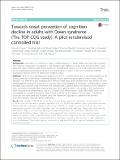Files in this item
Towards onset prevention of cognition decline in adults with Down syndrome (The TOP-COG study) : a pilot randomised controlled trial
Item metadata
| dc.contributor.author | Cooper, Sally-Ann | |
| dc.contributor.author | Ademola, Temitope | |
| dc.contributor.author | Caslake, Muriel | |
| dc.contributor.author | Douglas, Elizabeth | |
| dc.contributor.author | Evans, Jonathan | |
| dc.contributor.author | Greenlaw, Nicola | |
| dc.contributor.author | Haig, Caroline | |
| dc.contributor.author | Hassiotis, Angela | |
| dc.contributor.author | Jahoda, Andrew | |
| dc.contributor.author | McConnachie, Alex | |
| dc.contributor.author | Morrison, Jill | |
| dc.contributor.author | Ring, Howard | |
| dc.contributor.author | Starr, John | |
| dc.contributor.author | Stiles, Ciara | |
| dc.contributor.author | Sirisena, Chammy | |
| dc.contributor.author | Sullivan, Frank | |
| dc.date.accessioned | 2017-05-11T15:30:13Z | |
| dc.date.available | 2017-05-11T15:30:13Z | |
| dc.date.issued | 2016-07-29 | |
| dc.identifier | 249968792 | |
| dc.identifier | 3e7b5c82-545e-4453-812e-10b133f9e2fe | |
| dc.identifier | 27473843 | |
| dc.identifier | 84979705707 | |
| dc.identifier.citation | Cooper , S-A , Ademola , T , Caslake , M , Douglas , E , Evans , J , Greenlaw , N , Haig , C , Hassiotis , A , Jahoda , A , McConnachie , A , Morrison , J , Ring , H , Starr , J , Stiles , C , Sirisena , C & Sullivan , F 2016 , ' Towards onset prevention of cognition decline in adults with Down syndrome (The TOP-COG study) : a pilot randomised controlled trial ' , Trials , vol. 17 , 370 . https://doi.org/10.1186/s13063-016-1370-9 | en |
| dc.identifier.issn | 1745-6215 | |
| dc.identifier.other | PubMedCentral: PMC4966871 | |
| dc.identifier.other | ORCID: /0000-0002-6623-4964/work/33508487 | |
| dc.identifier.uri | https://hdl.handle.net/10023/10754 | |
| dc.description | This study was funded by the Chief Scientist Office, Scottish Government Health Department (reference: CZH/4/626). JS is funded by the NHS Lothian R&D Directorate. | en |
| dc.description.abstract | Background : Dementia is very common in Down syndrome (trisomy 21) adults. Statins may slow brain amyloid β (Aβ, coded on chromosome 21) deposition and, therefore, delay Alzheimer disease onset. One prospective cohort study with Down syndrome adults found participants on statins had reduced risk of incident dementia, but there are no randomised controlled trials (RCTs) on this issue. Evidence is sparse on the best instruments to detect longitudinal cognitive decline in older Down syndrome adults. Methods : TOP-COG was a feasibility/pilot, double-blind RCT of 12 months simvastatin 40 mg versus placebo for the primary prevention of dementia in Alzheimer disease in Down syndrome adults aged 50 years or older. Group allocation was stratified by age, apolipoprotein E (APOE) ε4 allele status, and cholesterol level. Recruitment was from multiple general community sources over 12 months. Adults with dementia, or simvastatin contraindications, were excluded. Main outcomes were recruitment and retention rates. Cognitive decline was measured with a battery of tests; secondary measures were adaptive behaviour skills, general health, and quality of life. Assessments were conducted pre randomisation and at 12 months post randomisation. Blood Aβ40/Aβ42 levels were investigated as a putative biomarker. Results were analysed on an intention-to-treat basis. A qualitative sub-study was conducted and analysed using the Framework Approach to determine recruitment motivators/barriers, and participation experience. Results : We identified 181 (78 %) of the likely eligible Down syndrome population, and recruited 21 (11.6 %), from an area with a general population size of 3,135,974. Recruitment was highly labour-intensive. Thirteen (62 %) participants completed the full year. Results favoured the simvastatin group. The most appropriate cognitive instrument (regarding ease of completion and detecting change over time) was the Memory for Objects test from the Neuropsychological Assessment of Dementia in Individuals with Intellectual Disabilities battery. Cognitive testing appeared more sensitive than proxy-rated adaptive behaviour, quality of life, or general health scores. Aβ40 levels changed less for the simvastatin group (not statistically significant). People mostly declined to participate because of not wanting to take medication, and not knowing if they would receive simvastatin or placebo. Participants reported enjoying taking part. Conclusion : A full-scale RCT is feasible. It will need 37 % UK population coverage to recruit the required 160 participants. Information/education about the importance of RCT participation is needed for this population. | |
| dc.format.extent | 16 | |
| dc.format.extent | 1129720 | |
| dc.language.iso | eng | |
| dc.relation.ispartof | Trials | en |
| dc.subject | Alzheimer disease | en |
| dc.subject | Dementia | en |
| dc.subject | Down syndrome | en |
| dc.subject | Neuropsychology | en |
| dc.subject | Primary prevention | en |
| dc.subject | Simvastatin | en |
| dc.subject | Statin | en |
| dc.subject | RC0321 Neuroscience. Biological psychiatry. Neuropsychiatry | en |
| dc.subject | NDAS | en |
| dc.subject | BDC | en |
| dc.subject.lcc | RC0321 | en |
| dc.title | Towards onset prevention of cognition decline in adults with Down syndrome (The TOP-COG study) : a pilot randomised controlled trial | en |
| dc.type | Journal article | en |
| dc.contributor.institution | University of St Andrews. School of Medicine | en |
| dc.identifier.doi | https://doi.org/10.1186/s13063-016-1370-9 | |
| dc.description.status | Peer reviewed | en |
This item appears in the following Collection(s)
Items in the St Andrews Research Repository are protected by copyright, with all rights reserved, unless otherwise indicated.

